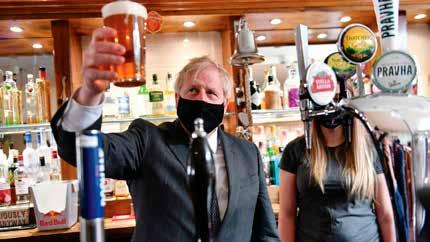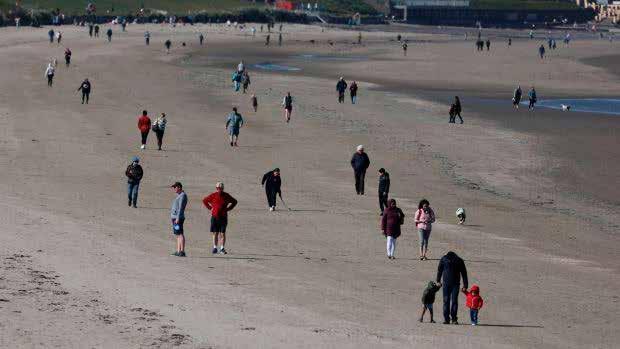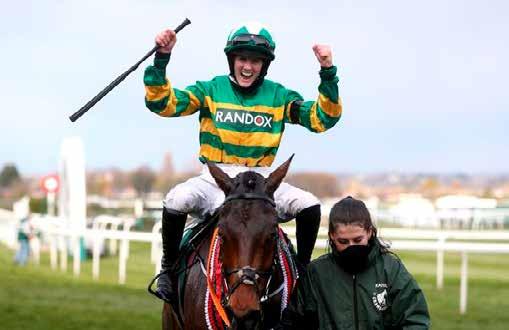
8 minute read
There is a lack of responsibility among those in power in Ireland
By Ian Casserly
“In stage one, we say nothing is going to happen. In stage two, we say something may be going to happen, but we should do nothing about it. In stage three, we say that maybe we should do something about it, but there’s nothing we can do. In stage four we say there was something we could’ve done but it’s too late now.”
Advertisement
The above is the transcript of a short clip from the BBC’s satirical political comedy series “Yes Minister” that aired back in the
1980s. The clip sees two fictional English civil servants Paul Eddington and Nigel Hawthorne talking about how the Foreign Office typically responds in a time of crises. Whilst obviously a comedy, by labelling it a documentary it wouldn’t be too far from reality. That clip was brought back into the spotlight last year when these four steps somewhat matched the government’s response to the pandemic around Christmas. From their promise of a “meaningful” Christmas, to doing nothing when warned about the repercussions of the said “meaningful” Christmas, to the imminent spike in cases following this “meaningful” Christmas to finally the admittance that a “meaningful” Christmas shouldn’t have happened, but nothing can be done now, the government followed these steps nearly ad verbatim.
This attitude around a Christmas reopening during the pandemic encapsulated many parts of the “sure-it’ll-be-grand-ism” of Ireland. This attitude has pestered Ireland and especially Irish politics over the past decades. From recent examples of Government approved financial institutions breaking financial legislation to Anglo Irish Bank and its reckless lending practices, the lack of any major consequence to these scandals have been nothing short of a major scandal.
This problem is not new and has existed for years upon years in Ireland and Irish Institutions. This problem was even a running joke in the Irish show Father Ted with Father Ted himself being sent to a parish on Craggy Island as punishment for using money designated for sick children to visit Lourdes on his own extravagant trip.
This “sure-it’ll-be-grand-ism” has reared its head again with the numerous scandals originating from the government’s vaccine rollout programme. As reported in national media a certain hospitals CEO allegedly broke HSE protocol by allegedly appropriating vaccines to groups who were not in line to receive doses but were related to the CEO in some way.
The outcome of this? An independent review conducted on behalf of the non-executive directors of the said hospital.
This lack of punishment or accountability is not contained to any one political party or institution but nearly every institution within Ireland. Typically, the most accountability one will face is an independent review or an infamous tribunal.
These Tribunals were also the victim of jokes about their ineffectiveness. Take for example a famous Irish Politician and former Taoiseach who was involved in corrupt payments relating to political decisions in Dail Eireann back in the 1990’s. This alleged corruption resulted in a 15-year, €300 million tribunal in which he was found to have partaken in this corruption. The repercussions of this finding? He stood down from his job.
The lack of accountability and prosecution in Ireland over blatant criminal offenses is shocking but not unexpected and if not dealt with, it will continue to be a problem.
If only we could’ve done something before it was too late…

What will this summer look like?
By Darren Casserly
It has been a year to forget for most people in the pandemic with very little lockdown measures lifted in that time. Now that there is an end in sight with vaccination numbers beginning to climb you can’t help but wonder, will this summer be different?
Most Irish people have found it hard over the last few weeks, looking across the Irish sea to the UK with their pubs and their hairdressers. Being jealous of the British is an awful feeling for most Irish people. The quicker things reopen the better, not just to use them, but also it would be great to stop feeling jealous of the Brits.
The government hopes to have 80 percent of vaccinated by June and while the government is not something that you can blindly trust, the ramp up in vaccinations is something of an indication. It really has come at the right time particularly for college students, who for the most part have been forgotten about this year and left to try and work from home which isn’t great in the best circumstances never mind what most college students are living in. It’s been a lonely year with very little benefits and the last few months have definitely been the worst with us passing a year in lockdown and doing so through the coldest and darkest part of the year has been near unbearable but the sun has come out a bit and so have the people and it can only get better from here.
It has unfortunately been confirmed that foreign holidays have been taken off the table this year, but that doesn’t mean you can’t have a great holiday in this country. It’s something that I feel most people agree with, reports that holiday homes in Connemara have been fully booked for June and July, there are plenty of places around the country that make for a great holiday. Whether it be a weekend stay in Dublin or a week in a holiday home in Wexford.
The phased reopening plan is also something that I will be keeping an eye out not just for barbers and hairdressers even though that would be at the top of most people’s lists after more than four months of home cuts and everyone knows those are two completely different things. The other thing that is on the top of most people’s lists would obviously be pubs and with the price of cheap alcohol going up. It doesn’t feel that much cheaper to drink at home these days and it’s a far worse experience.
There are an endless list of reasons why people want this to be over, from bad hair to missing friends the only thing in common is that everyone just wants this to be over. Better weather brings better moods and no matter how your year in the pandemic has been this summer definitely looks like it will be the first bit of normality that we’ve had in a long time.

Has Equestrian Sport run its race?
Clions Ní Laoi
I’d like to pose a question of how sustainable equestrian sports are going forward? PETA (People for Ethical Treatment of Animals) does not stand with equestrian sport. They state “horses deserve to live their lives as nature intended. We can connect with horses in our care and have a meaningful and mutually beneficial relationship with these sensitive animals without climbing on top of them.” Recent events have brought a very noble industry into disrepute. The acts of a handful should never reflect poorly on an entire industry.
It is understood that equestrian sports will be under intense scrutiny going forward. The sport claimed a spot in Olympic competition in 1912 & its risks have been a point of ongoing controversy ever since. In the discipline of eventing, periods of rider deaths worldwide (including 12 between 2007 & 2008) caused those at the core of the sport to voice ambivalence about these hazards, casualties, and fatalities.
In 2008, the President of the FEI warned that equestrian sports might not make it into the London 2012 Games. The International Olympic Committee had very reasonable and legitimate concerns about eventing safety. We see that everyday there are more eyes on our sport, be it from experts or ‘armchair activists’, they are all welfare concerns.
There is concern looming over the welfare of competition horses. What is sufficient grazing time? Is it morally reprehensible to back yearlings in the racing industry? Should we aspire to ride bitless, ‘bridleless’, with no artificial aids? On reflecting on this, the truth is that these animals are living in better conditions than humans in third-world countries
A push for further visibility is advised, whether it be further live streaming, more television coverage, and a greater understanding in the general public. Irish Equestrian Sport received a massive boost in 2020 after the Horse Sport Ireland Show Jumping Masters was televised on RTÉ. Thousands of people took to a sport that rarely received such a platform. We saw, the truth is that the vast majority of equestrians sport great horsemanship, they love their animals, treat them well, and they don’t adopt any practises that could be considered abusive.
We must continue to build awareness and accessibility to the greater public. It is a complex sphere, it does take time and explaining. It’s necessary to take time to educate others when you have the opportunity. There are steps that we can take going forward to make it better for our horses and the longevity of the sport.
There are measures being taken to modify the sport itself to make it safer. The UK has pioneered research into frangible pins, designed to prevent ‘rotational’ falls. Since 2006, BE required the use of frangible pins which are designed to collapse. The FEI is in the process of developing a comprehensive database of eventing horse injuries and deaths, so that we can get to the root of the issue and modify the sport for welfare enhancement.
Regardless of personal opinion, this area has valid arguments on both sides. We accept that we will be under intense scrutiny for years to come. What needs to be done is that we continue to build awareness and accessibility to the greater public. There are steps that we can take going forward to make it better, for our horses and the longevity of the sport.











